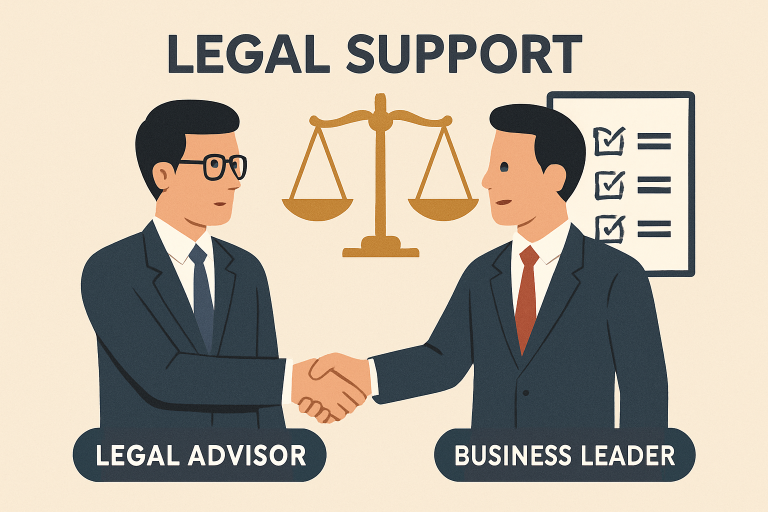Table of Contents
- Introduction
- Navigating Complex Regulations
- Risk Mitigation Strategies
- Leveraging Legal Analytics
- Enhancing Contract Management
- Embracing AI in Legal Practice
- Ensuring Ethical and Sustainable Practices
- Quantifying the Benefits of Legal Expertise
- Conclusion
Success in today’s fast-paced and regulated business world hinges not just on innovation or leadership, but also on the strength of legal expertise guiding operations. The role of a knowledgeable legal advisor can make the difference between overcoming obstacles and facing steep penalties, especially as companies expand into new markets or industries. With the proper support from experienced attorneys Spring Hill FL your organization can better navigate complexities and emerge in a stronger position. Legal professionals are strategic partners who align with business objectives and ensure compliance with legal frameworks. They provide essential guidance for risk mitigation and innovation, facilitating decision-making and protecting organizations from liabilities, thus building trust with stakeholders.
Navigating Complex Regulations
Regulatory compliance is a significant concern for organizations operating across multiple jurisdictions. Business leaders rely on legal advisors to untangle complex webs of local, national, and international laws, avoiding costly fines and reputational setbacks. In heavily regulated fields like logistics or finance, even minor oversights can result in multi-million-dollar penalties and expose companies to substantial risk. Knowledgeable legal guidance is instrumental in building compliance-first cultures and establishing meticulous protocols suited to the changing legal landscape.

Risk Mitigation Strategies
Proactive risk management is crucial to both the growth and preservation of a reputation. Legal teams implement policies and draft watertight agreements to mitigate exposure and protect vital organizational interests. Key strategies include:
- Dynamic Contract Management: Customizing contracts that anticipate potential disputes, clarify roles, and secure long-term interests.
- Efficient Dispute Resolution: Using alternative dispute resolution (ADR) methods to minimize litigation risks and costs.
- Continuous Regulatory Monitoring: Staying ahead of legislative updates to ensure ongoing compliance.
The World Economic Forum estimates that supply chain disruptions cost businesses an average of $184 million per year. Effective legal strategies mitigate these vulnerabilities and foster a proactive organizational mindset.
Leveraging Legal Analytics
Legal analytics—the use of data and statistical analysis in legal decision-making—empowers lawyers to provide greater strategic value. From predicting the likelihood of litigation outcomes to benchmarking against industry peers, analytics-based insights drive more informed planning. According to Lex Machina’s annual survey, 68% of law firms now deploy analytics to enhance their client offerings, with 57% relying on them for competitive intelligence. This evolution transforms legal teams from cost centers into revenue-protecting assets.
Enhancing Contract Management
Contracts are fundamental to every business relationship. Legal experts ensure contracts are meticulously drafted, clearly worded, and fully enforceable, minimizing misunderstandings and litigation risks. Strategic negotiation and ongoing review processes further protect organizational interests and facilitate smoother transactions with partners, vendors, and clients. The quality of contract management often determines operational efficiency, particularly as businesses expand and enter increasingly complex ecosystems.
Embracing AI in Legal Practice
Artificial Intelligence is rapidly transforming the legal field. AI-powered tools automate repetitive document reviews, analyze massive datasets for trends, and even predict legal outcomes based on precedent. Technologies like machine learning enable lawyers to focus on complex problem-solving while providing faster and more accurate insights for decision-makers. As these tools become more integrated into legal workflows, they help firms manage increasing volumes of information with greater precision and fewer errors.
Ensuring Ethical and Sustainable Practices
Modern legal practice extends beyond compliance to include facilitating ethical and sustainable operations. Guidance from legal professionals enables companies to adopt responsible sourcing, adhere to labor and environmental laws, and develop transparent governance structures. Most consumers indicate a preference—and willingness to pay a premium—for ethical brands, underscoring the tangible value of sustainability in business strategies.
Quantifying the Benefits of Legal Expertise
Investing in robust legal frameworks yields measurable results. An influential study by Harvard Business Review reported that companies with sophisticated legal strategies experience:
- 30% fewer compliance violations, lowering risks of fines and corrective measures;
- 20% faster dispute resolutions, resulting in decreased legal expenses and operational downtime;
- 25% higher operational efficiency, stemming from optimized contracts and proactive risk avoidance.
These benefits underscore the integral role of legal professionals in contributing to overall organizational performance and resilience.
Conclusion
Legal expertise is integral to thriving in a complex and challenging marketplace. From ensuring compliance and mitigating risk to leveraging cutting-edge technology and fostering ethical practices, skilled legal professionals do far more than support daily operations—they drive competitive advantage and position organizations for ongoing success. Harnessing their strategic insights enables companies to operate confidently and responsibly, thereby securing long-term growth and a strong reputation.







